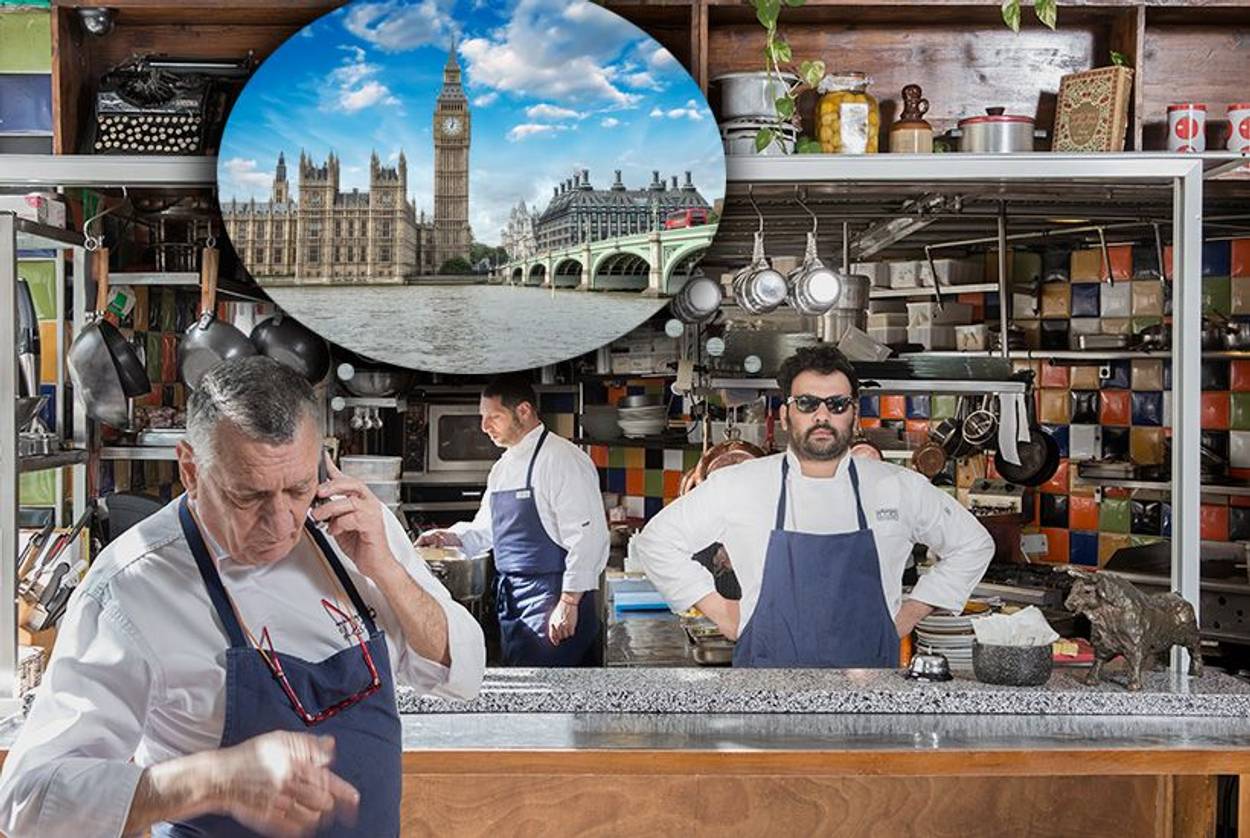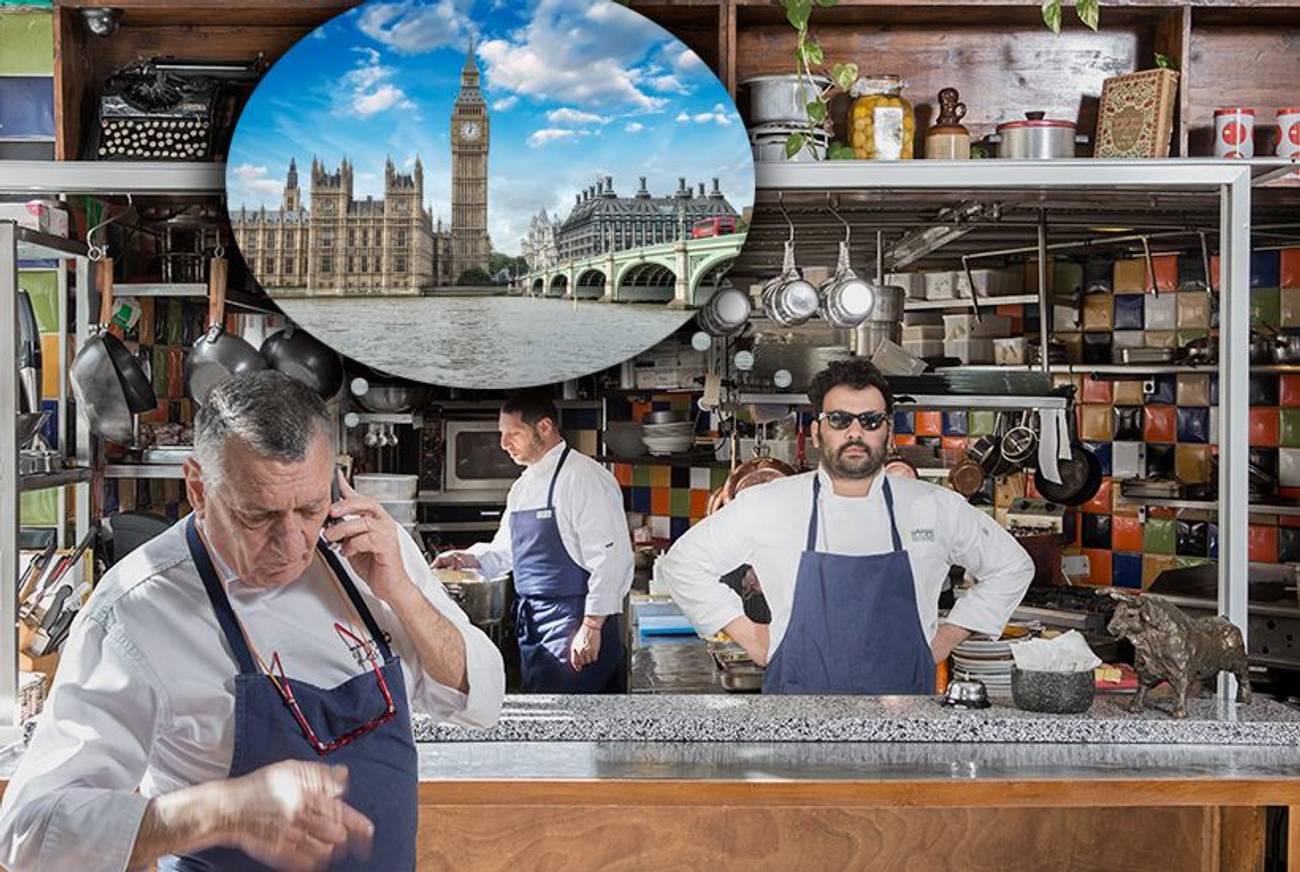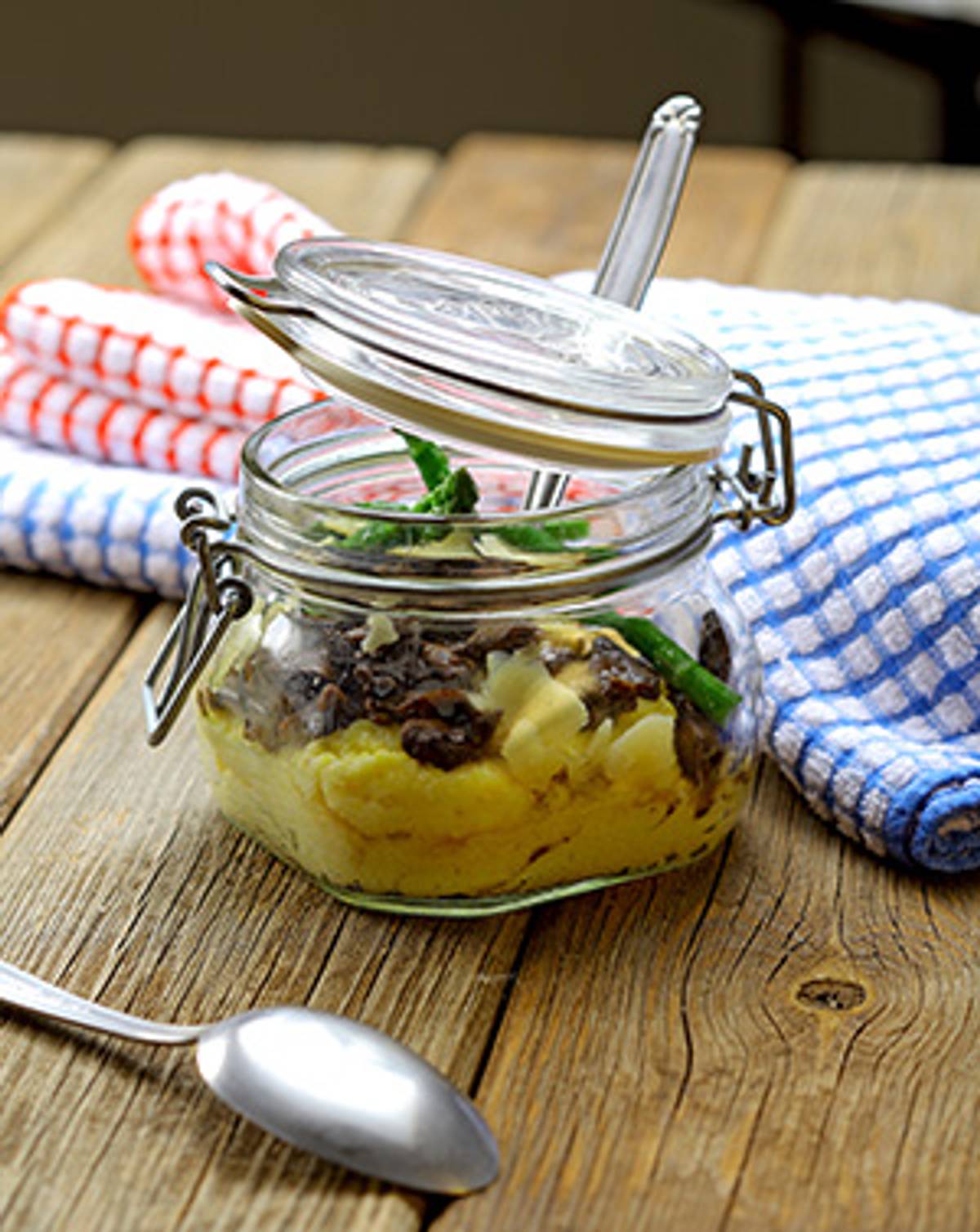Israeli Restaurateurs Broaden Their Horizons With a New Eatery in London
The chefs who made Machneyuda into Jerusalem’s hottest ticket team up with British nightclub owners to open The Palomar




Five years ago, three chefs in Jerusalem joined forces to create Machneyuda, a restaurant named for the way locals hurriedly pronounce “Machane Yehuda,” the city’s legendary shuk, or market. The cramped eatery—the open kitchen sometimes threatens to spill over into the dining area, which in turn doubles as a pantry—quickly became Jerusalem’s hottest ticket. Even the foodies of Tel Aviv, hitherto unaccustomed to leaving their own culinary mecca, began making pilgrimages.
Building on the success of Machneyuda, the chefs subsequently opened several more restaurants, but they had one thing in common: They were all in Jerusalem.
Until now. On May 27, those Israeli chefs will team up with two British nightlife impresarios to open The Palomar, a new restaurant in London’s Soho district. “We’re going to be doing our own thing: modern Jerusalem cuisine,” said Assaf Granit, one of the chefs. “We think there’s a craving for extreme tastes there, and we’re excited to see what the reaction will be.”
The elements of a typical night out at Machneyuda are by now iconic: the loud, eclectic playlist, which, combined with the kitchen staff’s propensity to imbibe alongside the guests, invariably leads to impromptu haflot—cooks beating on pots and pans with drumsticks while patrons dance on tables. Israel’s popular satire show Eretz Nehederet spoofed the restaurant in a skit, where a young Tel Aviv couple visiting the capital’s “Machneshuk” for the first time is feted by waitstaff prone to singing a lively refrain of “shik shak shuk.” At the entrance, a hostess cheerily informs a suicide bomber and an angry ultra-Orthodox Jew that tonight is not such a good time for them to visit: “We have guests here from Tel Aviv!” (They understand completely, and she serves them drinks while they wait.)
The success of Machneyuda spawned a wave of imitators. Restaurants around the country were mimicking Machneyuda’s humorously descriptive menus: “High-definition” tuna sashimi, Django Unchained-style entrecote, Uri’s mom’s famous semolina cake with tahini ice cream, and even a striped bass dish called “out of the depths I cry to you,” echoing a verse from Psalms. But they lacked Machneyuda’s secret weapons: its chefs—Granit, Yossi Elad, and Uri Navon—who displayed unique wizardry with the seasonal produce on offer in the adjacent market, and an informal atmosphere light-years away from anything resembling fine dining.
“I think the trend has come and gone,” Granit told me. “Trends never last for five years. The copycat restaurants have all closed.”
Granit, 35, sports a buzz cut and several tattoos, including one of a buffalo; buffalo is also his nickname, a relic of a heavier past. His is the most famous face of Machneyuda’s three chefs: He made it to the final of Israeli television’s Iron Chef prior to opening Machneyuda and spent the past five months as a judge for Game of Chefs, where he easily stepped into the role of tough guy. (One particularly memorable moment had him kicking a trash can repeatedly in frustration.) The ensuing attention, he said, has been good for business. Today he devotes the majority of his time to managing that business: The Machneyuda group, of which Granit is CEO, now owns and operates five restaurants employing 350 people. “It’s insane,” he said, “like running a factory.”
“The Machne,” Granit said, “was created in the image of its chefs, which is why it’s a little crazy. We wanted a place that could accommodate a fancy tasting menu for business people, while at the same time serve a drunken bachelorette party.” When the chefs rented a place across the street as extra kitchen space, they soon realized that their overflowing restaurant—booked solid months in advance—could use a bar for diners to hang out before their tables were ready. It became the Yudale, a tapas bar in the vein of its older sister and a minor institution in its own right, with an even more raucous atmosphere (and the added advantage, for the spontaneously minded, of accommodating walk-ins).
A year later, they took over and reworked the menu of Mona, a charming, classic restaurant in the Jerusalem Artists’ House, the historic former home of the Bezalel art school and one of the city’s most beautiful buildings. HaSadna (“The Workshop”), a highbrow steakhouse by the old railway station, followed. And last December they opened Talbiya, a café by day and wine bar by night in a hole in the wall beneath the Jerusalem Theater that for 35 years was the site of Jan’s Tea House, a local favorite. The new restaurants—managed by former sous-chefs groomed in-house to join Granit, Elad, and Navon as partners and chefs—rely almost exclusively on word-of-mouth for publicity and end up serving at full capacity on a regular basis.
It’s a far cry from Granit’s early days. A Jerusalemite from birth, Granit was raised in the city’s southern Nayot neighborhood. He fell in love with the kitchen after his military service, when he stepped in for the cook at the German Colony café where he was employed and essentially taught himself the ropes. But just as he was coming of age as a chef, the second intifada was raging outside and Jerusalem’s restaurants were empty. “It was frustrating. Most weeknights we’d spend most of our time waiting by the bar. It changes your whole perception, the fear seeps in deep,” he said. “Only today, five years after opening Machneyuda, I realize that my restaurants are full and I don’t have to worry anymore. I can invest in buying a nice new oven.”
Machneyuda opened just as Jerusalem Mayor Nir Barkat was beginning his first term, and the group’s restaurants have been an important part of the city’s subsequent revival and rebranding. “The Jerusalem renaissance couldn’t have asked for a better culinary champion,” said Itay Mautner, the artistic director of the Jerusalem Season of Culture, a summer arts festival. Last summer, under the auspices of the Season, Granit spent three weeks manning a food truck. As Mautner put it, “We took a big old truck and turned it into a fully equipped kitchen on wheels. Every day we set up shop at a different site, with a different dish and a different Jerusalemite who helped us serve it. We weren’t just trying to feed the city’s residents—we got to rich and poor, East Jerusalem and West, yeshiva boys and sports fans—but to tell the story of the city through the dishes we served.” Granit said it was one of the toughest summers he’s had but well worth the effort: “The last evening serving kifta dumplings with [Arab journalist] Eman Kassem-Sliman, atop Mount Scopus, with the view of the whole city, was quite moving for me,” he said. The recipes and stories have been collected in a lavish book; an English-language translation is forthcoming.
Opening new restaurants at such a rapid pace, Granit admitted, has had the negative effect of spreading his crew thin. “We’re always like this close to collapse. It makes things difficult for us, both management-wise and in our family lives,” said Granit, who is married and has an infant son. “But in the grand scheme of things I prefer to grow quickly and catch up later. It makes it hard to catch a breather, but I guess I don’t really like breathers all that much.”
As the Machneyuda empire expanded, offers from abroad began to pour in. While they still hope to open a New York restaurant in the not-so-distant future, the chefs preferred to start with a cosmopolitan city a bit closer to home. That Tel Aviv might be considered a nearby cosmopolitan city seems not to have occurred to them. “Tel Aviv is out of the question, it doesn’t interest us; we don’t want to be part of that swamp,” Granit said. “And besides, the Machne is essentially a Tel Aviv restaurant, with Tel Aviv customers, that happens to be based in Jerusalem.”
The owners started considering somewhere in Europe—Berlin, perhaps. Enter Layo Paskin. A recently retired English DJ, Paskin, 43, used to be half of the house music group Layo & Bushwacka! With his younger sister Zoe, he owned and ran The End, a nightclub with an adjacent restaurant, near London’s Covent Garden. After 14 years of business, the Paskins lost their lease in 2009. They dreamed of opening another restaurant and soon befriended the Machneyuda crew on one of Layo’s many trips to Jerusalem to spin music at Hauman 17, the city’s legendary nightclub. They began talking about a partnership. “Machneyuda are ambitious people, and it just felt very right,” Layo Paskin told me. The Paskins are Jewish, something that seems to have made the Israeli chefs more comfortable about working with them, but when I asked Layo whether his heritage had anything to do with his decision to partner with an Israeli team, he took a few moments to think. “I think there’s a part of me that feels good about bringing this to London, coming full circle,” he said. “I’m not at all religious, but on the cultural level I take it very seriously.”
In January 2013, the chefs and the Paskins started looking for a place—“not the easiest thing to do in London,” Layo said—and finally, last summer they found one on Rupert Street in Soho. The proximity to Leicester Square is roughly the same as Machneyuda’s to the shuk, but the surroundings couldn’t be more different, with London’s West End theaters and Chinatown eateries taking the place of Jerusalem’s market’s stalls and pubs.

The Palomar is both a Machneyuda transplant in London and a unique creature in its own right. The menu is similar; Londoners will get a taste of Machneyuda’s most popular dishes, including creamy polenta in a jar (which received Martha Stewart’s stamp of approval when she hosted Navon on her show). The restaurant aims to recreate the Jerusalem-style warm hospitality: Diners have eye contact with the chefs from the moment they enter and are immediately surrounded by produce. The bar facing the open kitchen is open to walk-ins. But what about those nightly dance sessions? “Our feeling is that Soho is the best location for getting a little bit wild, but obviously people in Jerusalem are quite different. The weather denotes a completely different culture,” said Paskin, ever the Englishman. “I really hope it can develop organically in that direction, but you never know how people will respond. A Londoner might let her hair down in Jerusalem, but will she do that in London?” Granit, himself a somewhat reticent man who initially had trouble adapting to the Machneyuda haflot, will stay on site for the first weeks of operation, primarily to gauge the diners’ reactions. “We’ll start with the volume low, and see how things go,” he told me. When he departs, he’ll leave the reins with the head chef, Tomer Amedi, another former protégé, who most recently ran the Yudale; Amedi’s wife, Yael Vardi, is the pastry chef.
The Palomar’s name is meant to evoke the Middle East and Mediterranean, while also being pronounceable (the local crew has trouble enough saying the names of the Israeli chefs, Paskin told me, let alone the mouthful that is Machneyuda). It is far from being the first London restaurant with strong Israeli ties. Honey & Co., an Israeli-run cafe in Fitzrovia, has been a hit since its 2012 opening (Time Out wrote that “finding a spare table at short notice is rarer than finding a burning bush in the desert”). Golders Green is swarming with kosher restaurants, some of which are operated by Israelis.
But the sole towering figure is, of course, Yotam Ottolenghi. Alongside his partner, Sami Tamimi, a fellow ex-Jerusalemite (Tamimi hails from East Jerusalem), Ottolenghi owns four delis that offer casual dining, and a classier restaurant, NOPI. But his three cookbooks—particularly his most recent, Jerusalem, co-authored with Tamimi—have catapulted him and the city’s cuisine to a previously unimaginable level of popularity. A recent BBC poll found that 72 percent of U.K. citizens have primarily negative views of Israel. If there is one thing that makes Paskin optimistic about the success of a London-based restaurant that plans on proudly flaunting its Jerusalem roots, it is Ottolenghi. “He’s paved the way for people having a much more open mind, and created a big appetite for the sort of authentic cuisine we serve,” he said. London, with its 8 million residents (not to mention almost 17 million tourists in 2013), is home to thousands of restaurants—there is nothing there that resembles the vacuum Machneyuda took advantage of in Jerusalem. But on this point, too, Paskin is confident: “The choice means that you’ve got to compete at a level where you’re at the very top of your game, because we’re entering a market where everyone else is doing that. But the angle we have is that they’re great at what they do, and it’s an amazing night out.”
Ronit Vered, who covers the culinary world both in Israel and abroad for Haaretz, saw The Palomar’s potential for success. “Of course it’s difficult to predict how the restaurant will fare, but there’s certainly a huge interest in Mediterranean cuisine and particularly in Israeli cuisine,” she said. “Places like Ottolenghi’s restaurants in London and Breads Bakery in New York have benefited greatly from that interest.” Vered suspects that Europeans and Americans have an easier time with Middle Eastern food when they receive it through Israeli “mediation.” “For many people, the Arab world still seems foreign and threatening, and a group like Machneyuda makes that food seem happier and more modern,” she said. “They even make it easier on the palate, with their Western-style cooking techniques. Managing a restaurant in London from a home base in Israel will be a challenge, but at least so far as an audience is concerned, there is no lack of interest in what they have to offer.”
Layo Paskin believes that the new restaurant will open English patrons’ eyes. “Because of the issues Israel has, most people don’t realize just how developed the restaurant scene there is,” he said. “My wife, who is Brazilian, was completely blown away there. So, I think there’s a hope in the back of mind that it will change the way people think of Israel, help them realize that it isn’t just falafel and hummus.”
Tal Kra-Oz is a writer based in Tel Aviv.